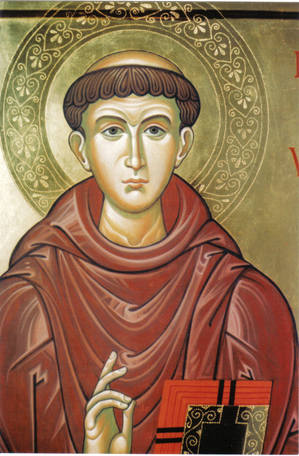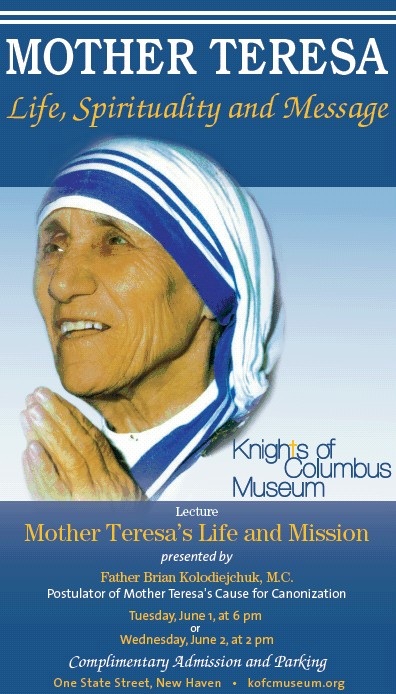
June 2010 Archives
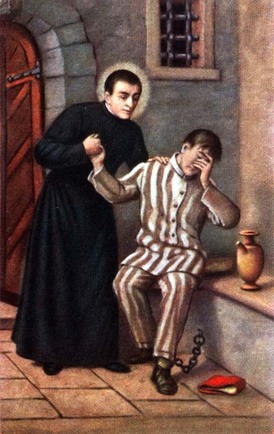
The Pope's weekly general audience address today was dedicated to Saint Joseph Cafasso (1811-1860), a member of the "St Francis of Assisi Institute," a priest (ordained in 1833) who died 150 years ago. He is most known as Saint John Bosco's spiritual father (director) from 1835 to 1860. Cafasso died in 1860; Pius XII canonized in him 1947. In 1948, Pope Pius XII named him the patron of Italian prisons and, in 1950, proposed him "as a model for priests involved in Confession and spiritual direction." His uncle is Blessed Joseph Allamano. Saint Joseph Cafasso's feast day is June 23.
I never heard of Saint Joseph Cafasso until today, partly because I am not well attuned to the life of Saint John Bosco of which he seems to be most connected. According to the Benedict, Joseph Cafasso's ministry helped to form "the true pastor with a rich interior life and a profound zeal for pastoral care: faithful in prayer, committed to preaching and catechesis, dedicated to the Sacraments of the Eucharist and Confession, in keeping with the model incarnated by St. Charles Borromeo and St. Francis of Sales, and promoted by the Council of Trent. St. Joseph Cafasso sought to establish this model in the formation of young priests so that, in their turn, they too could become formators to other priests, religious and lay people, thus creating a unique and effective chain." AND how could anyone NOT take Saint Joseph Cafasso as a paradigm for Christian life?
A theme that I am picking up these days from some of the Pope's addresses is the constant need to stay in the "state of grace." You might say, "no Kidding, Paul! Really?" Mock if you want, but there is an increasing distancing from God, especially staying close to God by means of staying in a state of grace through the sacrament of confession. We know that the pure of heart are the ones who inherit the kingdom of God. One of the things we know of Saint John Vianney is that he devoted himself to confessional. Cafasso, the Pope said, "loved the Lord totally, he was animated by a well-rooted faith and supported by profound and prolonged prayer, he showed sincere charity to everyone. He knew moral theology but was equally well aware of the condition of people's hearts for which, like the good shepherd, he took responsibility."
Benedict XVI explained that that Saint John Bosco never copied his master. Not an insignificant point: we need to take under consideration those who guide us but we also need to assert our independence from a "master teacher" in order for grace to flourish. Otherwise we merely parrot the other in an unthinking manner. The Pope said, "He imitated him in the human and priestly virtues - defining him as a 'model of priestly life' - but maintained his own attitudes and his own specific vocation. ... This is a precious lesson for those involved in the formation and education of the young generations."
What may be interesting for us to
know is that Saint Joseph Cafasso was renown for his "concern for the lowest, especially for prisoners
... who lived in inhuman and dehumanizing conditions." Characteristic of Cafasso's
work with prisoners is remembered today as he "often delivered great sermons
that came to involve almost the entire prison population, with the passage of
time he came to favor individual catechesis, made up of conversations and
personal meetings. While respecting the individual situation of each
individual, he tackled the great themes of Christian life, speaking of trust in
God, adherence to His will, the utility of prayer and the Sacraments, the
culmination of which is Confession, the meeting with God Who, for us, becomes
infinite mercy."
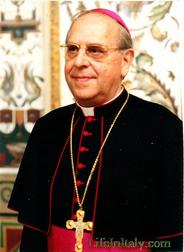
Archbishop Antonio Maria Vegliò, president of the Pontifical Council for the Pastoral Care of Migrants and Itinerant Peoples, published a letter today for World Tourism Day addressing the theme of "Tourism and Biodiversity" as proposed by the World Tourism Organization; the theme of "International Year for Biological Diversity" was adopted by the General Assembly of the United Nations in 2006. As Archbishop Vegliò noted, "This proclamation was born of the deep concern for 'the social, economic, environmental and cultural implications of the loss of biodiversity, including negative impacts on the achievement of the Millennium Development Goals, and stressing the necessity to adopt concrete measures in order to reverse it.'"
This
particular Council, according to the 1987 Apostolic Constitution Pastor Bonus,
has as its work the "pastoral solicitude of the Church to the particular needs
of those who have been forced to abandon their homeland, as well as to those
who have none" (149) and "is committed to assuring that journeys undertaken for
reasons of piety, study or relaxation may aid in the moral and religious
formation of the faithful; It assists particular Churches so that all those who
are far from home may be given adequate pastoral assistance (151). It also
oversees the Apostleship of the Sea.
The Church intensively cares for, is present to, the welfare of her children, indeed, she wants the happiness of all peoples, regardless of people's particulars. Why are these paragraphs important to me and perhaps to you? Because Archbishop Vegliò focuses our attention on the creative action of God in making the world ex nihilo and that He sustains us. I don't believe the Church is being politically correct in advocating "green theology" because it is fashionable. And, I don't think it would be acceptable to be dismissive of matters pertaining to the environment; whether we realize it or not, proper balance and respect for the environment is necessary for us today and in the future. This is why I think that dioceses, parishes, monasteries and school --in short, all constituencies-- ought to incorporate in their pastoral programs a proper catechesis on various subjects that promote and develop an environmental perspective. Catholics ought to take charge in being environmentally sensitive because of our fundamental belief that God is the creator of world, it is Scripturally well-founded, that God is the creator of us personally and because we care for all things that allow our humanity to thrive; and not least is the fact that all things are given for sustaining our life and giving glory to God. In other words, we really can't opt out of caring for the environment and calling those who abuse the environment on the micro and macro levels to be accountable. I wonder if one can argue that it is a mortal sin to abuse the environment. Respect for our biodiversity is not only a matter of faith and reason but our faith and good public order.
Nevertheless, Vegliò shows us that the Church is providing leadership for an authentic environmental perspective and goal that is truly human and humane. All our work should be balanced, reasonable and sustainable for the common good.
Some pertinent paragraphs of Archbishop Vegliò's letter follows:
As Pope Benedict XVI points out in his Encyclical letter Caritas in veritate, "in nature, the believer recognizes the wonderful result of God's creative activity, which we may use responsibly to satisfy our legitimate needs, material or otherwise, while respecting the intrinsic balance of creation" (48) and whose use represents for us "a responsibility towards the poor, towards future generations and towards humanity as a whole" (49). For this tourism must be respectful of the environment, looking to reach a perfect harmony with creation, so as to guarantee the sustainability of the resources on which it depends, while not leading to irreversible ecological transformations.

Contact with nature is important and therefore tourism must make an effort to respect and value the beauty of creation, from the conviction that "many people experience peace and tranquility, renewal and reinvigoration, when they come into close contact with the beauty and harmony of nature. There exists a certain reciprocity: as we care for creation, we realize that God, through creation, cares for us" (Benedict XVI, World Day of Peace 2010 message, 13).
There is an element that makes even this effort more imperative than ever. In the search for God, the human being discovers ways to bring himself closer to the Mystery, which has creation as a starting point (CCC 31). Nature and biological diversity speak to us of God Creator, He that makes himself present in His creation, "for from the greatness and the beauty of created things their original author, by analogy, is seen (Wis. 13:5), "for the original source of beauty fashioned them." (Wis. 13:3) This is why the world, in its diversity, "presents itself before man's eyes as evidence of God, the place where his creative, providential and redemptive power unfolds" (CSD 487) For this reason, tourism, bringing us closer to creation in its variety and wealth, can be an occasion to promote and increase the religious experience.
All of this makes looking for a balance between
tourism and biological diversity, in which they mutually support each other,
urgent and necessary, so that economic development and environmental protection
do not appear as opposed and incompatible elements, but rather that there is a
tendency to reconcile the demands of both (CSD 470).
Though they suffered on different days, Saints Peter and Paul are known as one, as Saint Augustine reminds.
In first hearing and then reading the papal homily I noticed some very crucial points for us to reflect upon and to seriously consider: the real persecution of the Church today and the impact on Catholic identity exists not exclusively from outside the Church (a theme the pope has stated before now) but from the faithful's betrayal of the faith, of Truth. When secularism, not to be confused with secularity, infiltrates the Church the true message of the Gospel is obscured and our hearts are darkened.
As usual on today's solemn feast of Peter and Paul, Pope Benedict bestowed the pallium, the symbol of theological, juridical and fraternal communion between the pope and a bishop. It is also a symbol of the "fullness of charity and unity." In seeing the pallium we see, as Benedict says, a symbol of "the guarantee of freedom for the Church's Pastors and the Communities." Today, 38 archbishops from around the world received the pallium, including three archbishops from the USA and one from Canada.
The Pope's exhortation and prayer upon giving the pallium:
To the glory of God and the praise of the Blessed Virgin Mary and of the apostles Peter and Paul, and of the Holy Roman Church, for the honor of the Churches, which have been placed in your care, and as a symbol of your authority as metropolitan archbishop: We confer on you the pallium taken from the tomb of Peter to wear within the limits of your ecclesiastical provinces.
And then
May this pallium be a symbol of unity and a sign of your communion with the Apostolic See, a bond of love, and an incentive to courage. On the day of the coming and manifestation of our great God and chief shepherd, Jesus Christ, may you and the flock entrusted to you be clothed with immortality and glory. In the name of the Father, and of the Son and of the Holy Spirit.
Below is Benedict's homily for today's Mass (with my own points of emphasis).
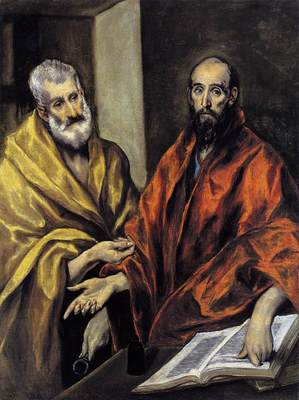
The biblical texts of this Eucharistic Liturgy of the Solemnity of Saints Peter and Paul, in their great wealth, highlight a theme that could be summarized thus: God is close to his faithful servants and frees them from all evil, and frees the Church from negative powers. It is the theme of the freedom of the Church, which has a historical aspect and another more deeply spiritual one.
This theme runs through today's Liturgy of the Word. The first and second readings speak, respectively, of St Peter and St Paul, emphasizing precisely the liberating action of God in them. Especially the text from the Acts of the Apostles describes in abundant detail the intervention of the Angel of the Lord, who releases Peter from the chains and leads him outside the prison in Jerusalem, where he had been locked up, under close supervision, by King Herod (cf. at 12.1 to 11). Paul, however, writing to Timothy when he feels close to the end of his earthly life, takes stock which shows that the Lord was always near him and freed him from many dangers and frees him still by introducing him into His eternal Kingdom (see 2 Tim 4, 6-8.17-18). The theme is reinforced by the Responsorial Psalm (Ps 33), and also finds a particular development in the Gospel of Peter's confession, where Christ promises that the powers of hell shall not prevail against his Church (cf. Mt 16:18).
Observing closely we note a certain progression regarding this issue. In the first reading a specific episode is narrated that shows the Lord's intervention to free Peter from prison. In the second Paul, on the basis of his extraordinary apostolic experience, is convinced that the Lord, who already freed him "from the mouth of the lion "delivers him" from all evil", by opening the doors of Heaven to him. In the Gospel we no longer speak of the individual Apostles, but the Church as a whole and its safekeeping from the forces of evil, in the widest and most profound sense. Thus we see that the promise of Jesus - "the powers of hell shall not prevail" on the Church - yes, includes the historical experience of persecution suffered by Peter and Paul and other witnesses of the Gospel, but it goes further, wanting to protect especially against threats of a spiritual order, as Paul himself writes in his Letter to the Ephesians: " For our struggle is not with flesh and blood but with the principalities, with the powers, with the world rulers of this present darkness, with the evil spirits in the heavens"(Eph 6:12).
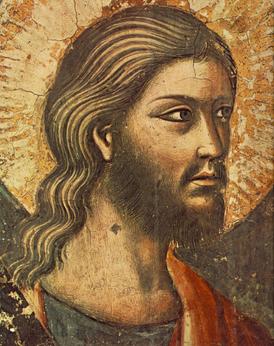
Indeed, if we think of the two millennia of Church history, we can see that - as the Lord Jesus had announced (cf. Mt 10.16-33) - Christians have never been lacking in trials, which in some periods and places have assumed the character of real persecution. These, however, despite the suffering they cause, are not the greatest danger for the Church. In fact it suffers greatest damage from what pollutes the Christian faith and life of its members and its communities, eroding the integrity of the Mystical Body, weakening its ability to prophesy and witness, tarnishing the beauty of its face. This reality is already attested in the Pauline Epistle. The First Epistle to the Corinthians, for example, responds to some problems of divisions, inconsistencies, of infidelity to the Gospel which seriously threaten the Church. But the Second Letter to Timothy - of which we heard an excerpt - speaks about the dangers of the "last days", identifying them with negative attitudes that belong to the world and can infect the Christian community: selfishness, vanity, pride, love of money, etc. (cf. 3.1 to 5). The Apostle's conclusion is reassuring: men who do wrong - he writes - "will not make further progress, for their foolishness will be plain to all" (3.9). There is therefore a guarantee of freedom promised by God to the Church, it is freedom from the material bonds that seek to prevent or coerce mission, both through spiritual and moral evils, which may affect its authenticity and credibility.
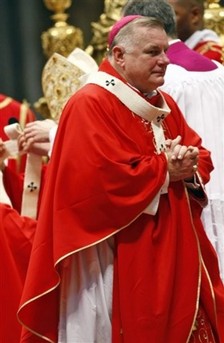
The theme of the freedom of the Church, guaranteed by Christ to Peter, also has a specific relevance to the rite of the imposition of the pallium, which we renew today for thirty-eight metropolitan archbishops, to whom I address my most cordial greeting, extending with it affection to all who have wanted to accompany them on this pilgrimage. Communion with Peter and his successors, in fact, is the guarantee of freedom for the Church's Pastors and the Communities entrusted to them. It is highlighted on both levels in the aforementioned reflections. Historically, union with the Apostolic See, ensures the particular Churches and Episcopal Conferences freedom with respect to local, national or supranational powers, that can sometimes hinder the mission of the ecclesial Church. Furthermore, and most essentially, the Petrine ministry is a guarantee of freedom in the sense of full adherence to truth and authentic tradition, so that the People of God may be preserved from mistakes concerning faith and morals. Hence the fact that each year the new Metropolitans come to Rome to receive the pallium from the hands of the Pope, must be understood in its proper meaning, as a gesture of communion, and the issue of freedom of the Church gives us a particularly important key for interpretation. This is evident in the case of churches marked by persecution, or subject to political interference or other hardships. But this is no less relevant in the case of communities that suffer the influence of misleading doctrines or ideological tendencies and practices contrary to the Gospel. Thus the pallium becomes, in this sense, a pledge of freedom, similar to the "yoke" of Jesus, that He invites us to take up, each on their shoulders (Mt 11:29-30). While demanding, the commandment of Christ is "sweet and light" and instead of weighing down on the bearer, it lifts him up, thus the bond with the Apostolic See - while challenging - sustains the Pastor and the portion of the Church entrusted to his care, making them freer and stronger.
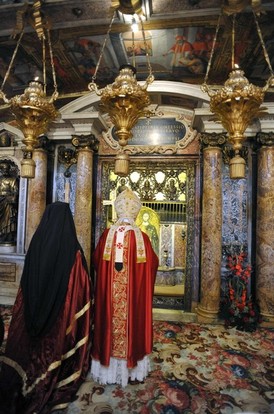
I would like to draw a final point from the Word of God, in particular from Christ's promise that the powers of hell shall not prevail against his Church. These words may also have a significant ecumenical value, since, as I mentioned earlier, one of the typical effects of the Devil is division within the Church community. The divisions are in fact symptoms of the power of sin, which continues to act in members of the Church even after redemption. But the word of Christ is clear: " Non praevalebunt - it will not prevail" (Matt. 16:18). The unity of the Church is rooted in its union with Christ, and the cause of full Christian unity - always to be sought and renewed from generation to generation - is well supported by his prayer and his promise. In the fight against the spirit of evil, God has given us in Jesus the 'Advocate', defender, and after his Easter, "another Paraclete" (Jn 14:16), the Holy Spirit, which remains with us always and leads the Church into the fullness of truth (cf. Jn 14:16; 16:13), which is also the fullness of charity and unity. With these feelings of confident hope, I am pleased to greet the delegation of the Patriarchate of Constantinople, which, in the beautiful custom of reciprocal visits, participates in the celebrations of the patron saints of Rome. Together we thank God for progress in ecumenical relations between Catholics and Orthodox, and we renew our commitment to generously reciprocate to God's grace, which leads us to full communion.
Dear friends, I
cordially greet all of you: Cardinals, Brother Bishops, Ambassadors and civil
authorities, in particular the Mayor of Rome, priests, religious and lay
faithful. Thank you for your presence. May the Saints Peter and Paul help you
to grow in love for the holy Church, the Mystical Body of Christ the Lord and
messenger of unity and peace for all men. May they also help you to offer the
hardships and sufferings endured for fidelity to the Gospel with joy for her
holiness and her mission. May the Virgin Mary, Queen of Apostles and Mother of
the Church, always watch over you and especially over the Ministry of
metropolitan archbishops. With her heavenly help may you always live and act in
that freedom that Christ has won for us. Amen.
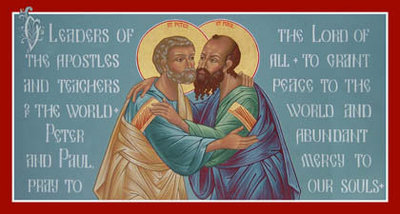
Copyright © 2010, World Library Publications
87 87 D; HYMN TO JOY, NETTLETON
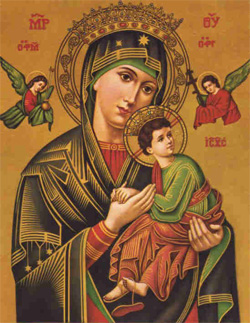
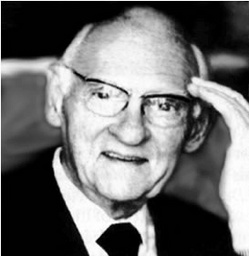
- Born on August 12, 1905
- Ordained priest on July 26, 1939
- Incardinated in the Diocese of Chur in 1950
- Nominated cardinal deacon on June 28, 1988 and assigned the title of S. Nicola in Carcere
- Died on June 26, 1988
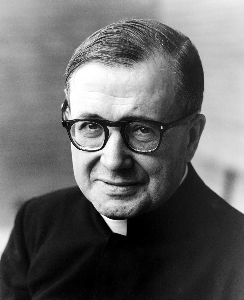 O God, through the mediation of Mary our Mother, You granted Your priest Saint Josemaría countless graces, choosing him as a most faithful instrument to found Opus Dei, a way of sanctification in daily work and in the fulfillment of the Christian's ordinary duties. Grant that I, too, may learn to turn all the circumstances and events of my life into occasions of loving You and serving the Church, the Pope and all souls with joy and simplicity, lighting up the pathways of this earth with faith and love. Deign to grant me, through the intercession of Saint Josemaría, the favor of ... (make your request). Amen.
O God, through the mediation of Mary our Mother, You granted Your priest Saint Josemaría countless graces, choosing him as a most faithful instrument to found Opus Dei, a way of sanctification in daily work and in the fulfillment of the Christian's ordinary duties. Grant that I, too, may learn to turn all the circumstances and events of my life into occasions of loving You and serving the Church, the Pope and all souls with joy and simplicity, lighting up the pathways of this earth with faith and love. Deign to grant me, through the intercession of Saint Josemaría, the favor of ... (make your request). Amen.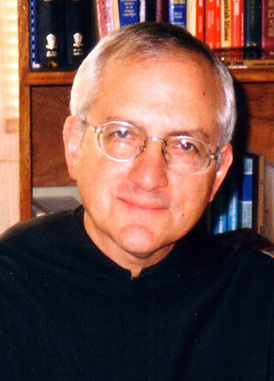 Father John Baptist Brahill, 61, was elected by his confreres of Marmion Abbey (Aurora, IL) to the 5th abbot. Abbot John succeeds Abbot Vincent de Paul Battaille who has served Marmion's abbot for the last 18 years.
Father John Baptist Brahill, 61, was elected by his confreres of Marmion Abbey (Aurora, IL) to the 5th abbot. Abbot John succeeds Abbot Vincent de Paul Battaille who has served Marmion's abbot for the last 18 years.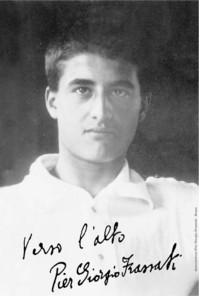 Today begins nine days of prayer in honor of Blessed Pier Giorgio Frassati, "the man of the 8 Beatitudes."
Today begins nine days of prayer in honor of Blessed Pier Giorgio Frassati, "the man of the 8 Beatitudes."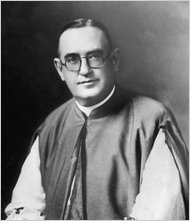
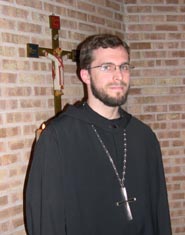 Today, the solemnly professed monks of Saint Procopius Abbey, elected Father Austin G. Murphy as their 10th abbot.
Today, the solemnly professed monks of Saint Procopius Abbey, elected Father Austin G. Murphy as their 10th abbot.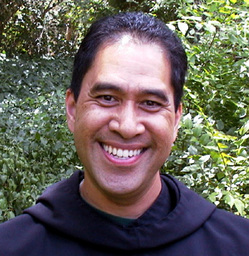 The monks of Saint Andrew's Abbey, Valyermo (CA) gathered to elect a new abbot, Damien Toilolo on June 22, replacing Abbot Francis who stepped down two years ago. The new abbas is the second elected abbas of St Andrew's.
The monks of Saint Andrew's Abbey, Valyermo (CA) gathered to elect a new abbot, Damien Toilolo on June 22, replacing Abbot Francis who stepped down two years ago. The new abbas is the second elected abbas of St Andrew's.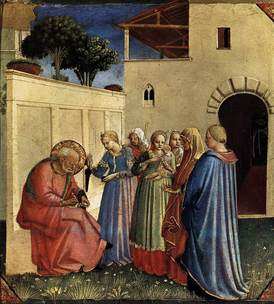 The Church celebrates as a solemnity the birth of the Savior's cousin, Saint John the Baptist. It is John who points to Jesus as the "path to salvation" and he teaches us that the encounter with the Lord requires to put aside our sinfulness and to put on purity of heart. It is as Isaiah says in the first reading which is applied to John the Baptist and it ought to be true for us: "I have labored in vain, I have spent my strength for nothing and vanity; yet surely my rights is with the Lord, and my recompense with my God."
The Church celebrates as a solemnity the birth of the Savior's cousin, Saint John the Baptist. It is John who points to Jesus as the "path to salvation" and he teaches us that the encounter with the Lord requires to put aside our sinfulness and to put on purity of heart. It is as Isaiah says in the first reading which is applied to John the Baptist and it ought to be true for us: "I have labored in vain, I have spent my strength for nothing and vanity; yet surely my rights is with the Lord, and my recompense with my God."A long forgotten tradition on the Vigil of the Nativity of Saint John the Baptist is the Blessing of a Bonfire. Confusion exists because in some people's minds the 1964 Roman Ritual was suppressed because it's absent in the US Bishops' Book of Blessings but it is advocated for in the Directory on Popular Piety.
Since it's not seen often in the USA it will be seen as esoteric. But those of concerned with Catholic identity and the flourishing of the sacred Liturgy in parishes, monasteries and religious communities. This blessing is one of the most ancient blessings.
Since St Augustine was the one to establish the feast day of the Baptist's birth, six months prior to the Savior's and in the summer solstice after the longest day of the year and when daylight incrementally lessens, a celebration of "light of the World" manifested by the Forerunner, it is an appropriate liturgical observance. Plus, the liturgical catechesis is limitless in this rite.
Because St John the Baptist's testimony to identity of Jesus as the true light which shines in the darkness of the world, the priest doing this rite can bring together several spiritual "themes" for expanding the heart. One can preach on John as the light-bearer before Christ; "he must increase, but I must decrease"; "I say to you, among those born of women there is not a greater prophet than John the Baptist."
The Rite
Priest: Our help is in the name of the Lord.
All: Who made heaven and earth.
P: The Lord be with you.
All: May He also be with you.
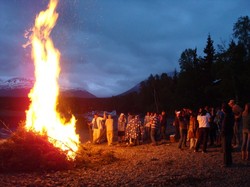
Let us pray. Lord God, almighty Father, the light that never fails and the source of all light, sanctify + this new fire, and grant that after the darkness of this life we may come unsullied to you who are light eternal; through Christ our Lord. All: Amen.
The fire is sprinkled with holy water; after which the clergy and the people sing the following hymn Hymn: Ut queant laxis
1. Ut queant laxis resonáre fibris Mira gestórum fámuli tuórum, Solve pollúti lábii reátum, Sancte Joánnes.
2. Núntius celso véniens Olympo Te patri magnum fore nascitúrum, Nomen, et vitae sériem geréndae Ordinae promit.
3. Ille promíssi dúbius supérni, Pérdidit promptae módulos loquélae: Sed reformásti genitus perémptae Organa vocis.
4. Ventris obstrúso récubans cubíli Sénseras Regem thálamo manéntem: Hinc parens nati méritis utérque Abdita pandit.
5. Sit decus Patri, genitaéque Proli et tibi, compare utriúsque virtus, Spíritus semper, Deus unus, omni Témporis aevo. Amen.
(the same in English)
1. O for your spirit, holy John, to chasten Lips sin-polluted, fettered tongues to loosen; So by your children might your deeds of wonder Meetly be chanted.
2. Lo! a swift herald, from the skies descending, Bears to your father promise of your greatness; How he shall name you, what your future story, Duly revealing.
3. Scarcely believing message so transcendent, Him for a season power of speech forsaketh, Till, at your wondrous birth, again returneth, Voice to the voiceless.
4. You, in your mother's womb all darkly cradled, Knew your great Monarch, biding in His chamber, Whence the two parents, through their offspring's merits, Mysteries uttered.
5. Praise to the Father, to the Son begotten, And to the Spirit, equal power possessing, One God whose glory, through the lapse of ages, Ever resounding. Amen.
P: There was a man sent from God.
All: Whose name was John.
Let us pray. God, who by reason of the birth of blessed John have made this day praiseworthy, give your people the grace of spiritual joy, and keep the hearts of your faithful fixed on the way that leads to everlasting salvation; through Christ our Lord.
All: Amen.
Philip
T. Weller, The Roman Ritual
(The Bruce Publishing Company, Milwaukee, WI, 1964).
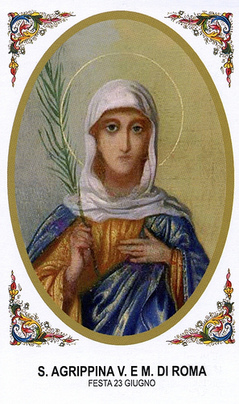
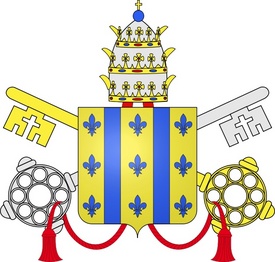
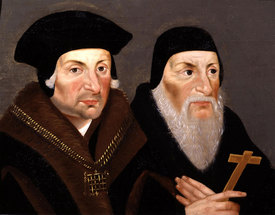 If you are reproached for the name of Christ, you are blessed, because the spirit of glory and of God rests upon you.
If you are reproached for the name of Christ, you are blessed, because the spirit of glory and of God rests upon you.On the occasion of the 40th anniversary Dei Verbum in 2005, Pope Benedict made what I think is a brilliant claim that lectio divina will be instrumental in bringing a new era in the Church. The Pope said:
In this context, I would like in particular way to recall and recommend the ancient tradition of "Lectio divina": "the diligent reading of Sacred Scripture accompanied by prayer brings about that intimate dialogue in which the person reading hears God who is speaking, and in praying, responds to him with trusting openness of heart" (cf. "Dei Verbum," n. 25). If it is effectively promoted, this practice will bring to the Church -- I am convinced of it -- a new spiritual springtime. (16 September 2005)
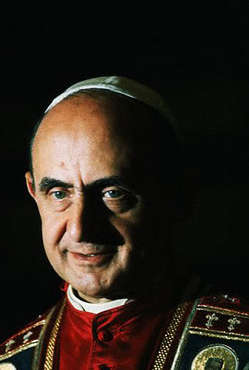
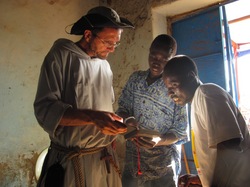 Missions to help people find their true humanity and to know the mercy of Christ and friends, always needs our personal attention: friendship, prayers & study and financial assistance. Can I get you thinking about the foreign missions by personally undertaking some work to know the good work of missionaries and the work of the Holy Spirit?
Missions to help people find their true humanity and to know the mercy of Christ and friends, always needs our personal attention: friendship, prayers & study and financial assistance. Can I get you thinking about the foreign missions by personally undertaking some work to know the good work of missionaries and the work of the Holy Spirit? 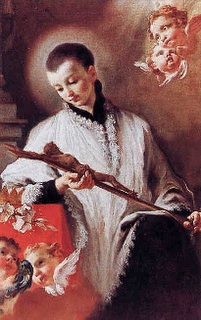 Who shall climb God's holy mountain?
Who shall climb God's holy mountain?Stand within his holy place?
Those whose hearts are pure and lowly,
Free of guile and full of grace!
On this day, O Lord, we thank you
For your servant's selfless life
Which he offered you with gladness,
Leaving wealth and earthly strife.
Aloysius, born as gentry,
Heard from youth your gentle call,
And, renouncing rank and riches,
Followed you and gave his all.
In the service of those sickened
By the plague, he spent himself,
Thus exhausting earthly body,
Storing up the one true wealth.
Father, Son, and Spirit blest,
With your servant Aloysius
And the host of saints at rest,
We sing forth our song of gladness
For your saints, your works of grace;
Lead us on in humble service
Till we see you face to face!
J. Michael Thompson
Copyright © 2010, World Library Publications
87 87 D, HOLY MANNA, AUSTRIA
 Today is a celebration of Fatherhood. Father's Day is an observance we've had since 1910.
Today is a celebration of Fatherhood. Father's Day is an observance we've had since 1910. 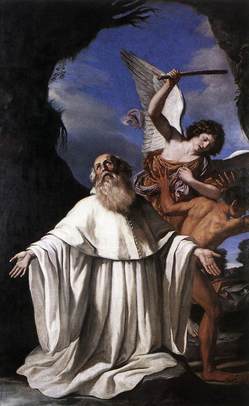 All that I seek to know on earth is Christ,
All that I seek to know on earth is Christ,The power of his resurrected life,
To share the suff'rings that he bore for me,
Thus shall I triumph over death and strife.
So Romuald, the solitary man,
Became a living icon of his Lord,
In prayer and self-denial formed his monks
And molded them within the silent Word.
O Father, Son, and Spirit ever blessed,
We raise our hearts in silence and in praise!
With Romuald and all the heav'nly choir,
We praise you, Lord of Life, for all our days!
J. Michael Thompson
Copyright © 2010, World Library Publications
10 10 10 10
SURSUM CORDA, WOODLANDS
 Exploring the Word of God is an ongoing work for all Christians. Catholics have a good opportunity on June 26 to do some work on last Synod of Bishops on the Word of God. It is a good, necessary and beautiful thing to spend time with God as He's revealed in sacred Scripture.
Exploring the Word of God is an ongoing work for all Christians. Catholics have a good opportunity on June 26 to do some work on last Synod of Bishops on the Word of God. It is a good, necessary and beautiful thing to spend time with God as He's revealed in sacred Scripture. Yesterday, Thursday, 17 June, the delegates to the General
Chapter elected Abbot Hugh Richard Anderson OSB to a six-year term as the
fifteenth President of the American-Cassinese
Congregation. The fiftieth general chapter was convened at St. Bernard Abbey, Cullman, Alabama, 13-18
June 2010.
Yesterday, Thursday, 17 June, the delegates to the General
Chapter elected Abbot Hugh Richard Anderson OSB to a six-year term as the
fifteenth President of the American-Cassinese
Congregation. The fiftieth general chapter was convened at St. Bernard Abbey, Cullman, Alabama, 13-18
June 2010. 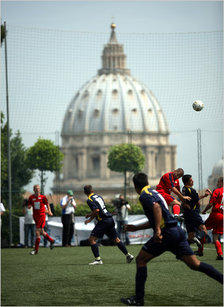 The other day the NY Times had a positive story about happenings in the Catholic Church. Yes, it's possible that a good human interest story dealing with Catholic seminarians!
The other day the NY Times had a positive story about happenings in the Catholic Church. Yes, it's possible that a good human interest story dealing with Catholic seminarians!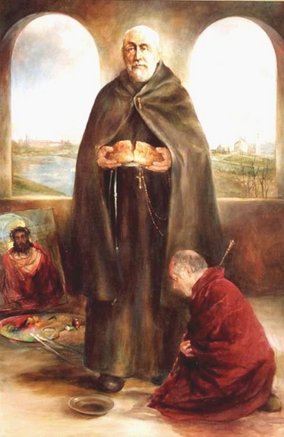
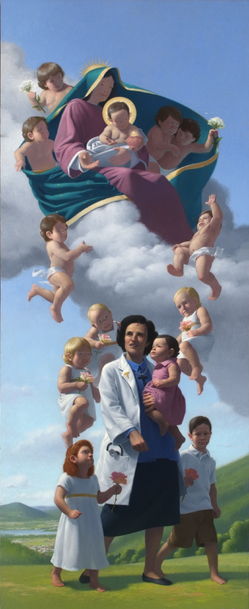
On Thursday, June 17, there will be a St Gianna Mass celebrated for the intentions of couples dealing with infertility issues at St Catherine of Siena Church (411 East 68th Street, New York).
All are welcome!
The program for the evening is as follows:
6:00 pm: Adoration of the Blessed Sacrament and Confessions
6:25 pm: Litany and Prayers to Saint Gianna
6:35 pm: Mass
7:30 pm: Infertility
Support Group and talk by Dr. Anne Melnik on Napro - Technology
The celebrant of the Mass and devotions will be Dominican Father Bruno Shah.
The St Gianna Mass will be celebrated on the 3rd Thursday of each month. This Mass and program is a natural outgrowth of the spiritual activities held in May for the blessing and public inauguration of the Gianna healthcare ministry working infertility and women's health.
Mark your calendar for the monthly St Gianna Mass:
July 15, August 19, September 16, October 21, November 18, December 16,
The St Gianna Mass is host by the Dominican Friars of St Catherine of Siena Church & Priory in close collaboration with the Dominican Friars Healthcare Ministry of NY and the Gianna Center.
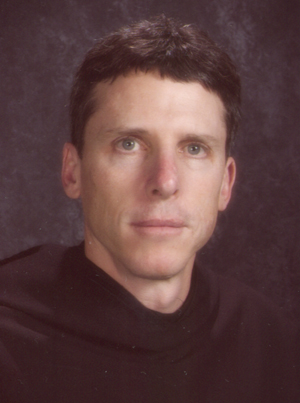 Your prayers are kindly requested today for the peaceful repose of Father Damien Anthony Daprai, OSB, 47, who is being laid to rest today. He died suddenly Friday morning during his morning job around his abbey's property. Father Damien was a monk of Marmion Abbey.
Your prayers are kindly requested today for the peaceful repose of Father Damien Anthony Daprai, OSB, 47, who is being laid to rest today. He died suddenly Friday morning during his morning job around his abbey's property. Father Damien was a monk of Marmion Abbey. Euronews reported today that the bishop of Córdoba, Bishop Demetrio Fernández González made a decision not allow Muslim worship in a former mosque in what is today a Roman Catholic Cathedral. I believe that Bishop Demetrio made a correct and prudent decision here.
Euronews reported today that the bishop of Córdoba, Bishop Demetrio Fernández González made a decision not allow Muslim worship in a former mosque in what is today a Roman Catholic Cathedral. I believe that Bishop Demetrio made a correct and prudent decision here.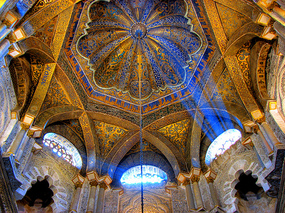
 Flag Day is celebrated every June 14, in commemoration of the June 14, 1777 authorization by Congress making the "stars and stripes" a national symbol for the United States of America. Congress said: "Resolved that the flag of the thirteen United States be Thirteen stripes alternate red and white: that the union be thirteen stars, white in a blue field, representing a new constellation." The national observance of flag day came with President Woodrow Wilson's 1916 proclamation establishing the day. In 1949, President Harry Truman signed an Act of Congress naming June 14 as "National Flag Day." More info can be found here.
Flag Day is celebrated every June 14, in commemoration of the June 14, 1777 authorization by Congress making the "stars and stripes" a national symbol for the United States of America. Congress said: "Resolved that the flag of the thirteen United States be Thirteen stripes alternate red and white: that the union be thirteen stars, white in a blue field, representing a new constellation." The national observance of flag day came with President Woodrow Wilson's 1916 proclamation establishing the day. In 1949, President Harry Truman signed an Act of Congress naming June 14 as "National Flag Day." More info can be found here.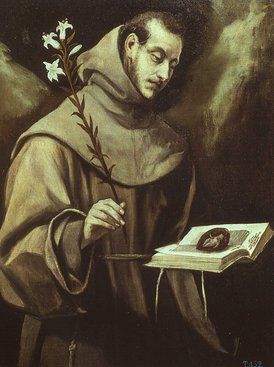 V. Our help is in the name of the Lord.
V. Our help is in the name of the Lord.Sing we all in joyful praise:
Anthony, your faithful son,
On this day has heaven won.
He, the preacher of the Word,
Lived in deed the truth he heard;
Called by martyr's death to be
Vowed to holy poverty.
Lord, accept the hymns we raise,
Singing Anthony's holy praise!
Faithful friar, in Francis' step
Bids us go where he has led,
Drawn by him, we offer laud
To Christ Jesus, Son of God.
Fearless teacher of the way,
Guiding us to work and pray,
Through his never-ceasing prayer
Leads us Christ-ward ev'rywhere.
Lord, accept the hymns we raise,
Singing Anthony's holy praise!
To the Father and the Son
And the Spirit, Three-in-One,
Hymns of glory, songs of love
Sing we, echoing those above.
With the angels' chorus high
Earth now makes this joyful cry;
With Saint Anthony we sing,
Praising God, our heav'nly King.
Lord, accept the hymns we raise,
Singing Anthony's holy praise!
J. Michael Thompson
Copyright © 2010, World Library Publications
77 77 D; MENDELSSOHN, (or, without refrain, SALZBURG)
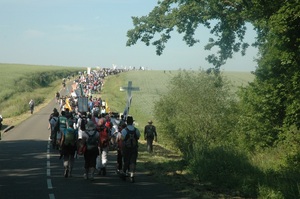 Going from point A to point B whether it is a physical move or a spiritual one is a pilgrimage. Something happens to the person making the move between points. Traditionally speaking a pilgrimage is not a tourist event nor is a undertaken for frivolous reasons. Tourism is fine and necessary but I want to think about a different type physical and spiritual journey not often talked about in Catholic circles today. It is a journey; it's a path walked; it is a time to review your life. A pilgrimage is time spent either alone or with others on a path to a change of heart, a conversion. Often we take on the burdens and the delights of a pilgrimage to gain a deeper insight into our lives as Christians asking questions about how the experience of Christ has changed me, or where I need to change based on what I discern the Lord to be asking.
Going from point A to point B whether it is a physical move or a spiritual one is a pilgrimage. Something happens to the person making the move between points. Traditionally speaking a pilgrimage is not a tourist event nor is a undertaken for frivolous reasons. Tourism is fine and necessary but I want to think about a different type physical and spiritual journey not often talked about in Catholic circles today. It is a journey; it's a path walked; it is a time to review your life. A pilgrimage is time spent either alone or with others on a path to a change of heart, a conversion. Often we take on the burdens and the delights of a pilgrimage to gain a deeper insight into our lives as Christians asking questions about how the experience of Christ has changed me, or where I need to change based on what I discern the Lord to be asking.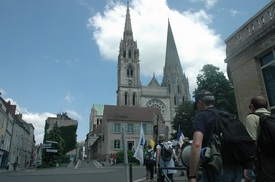
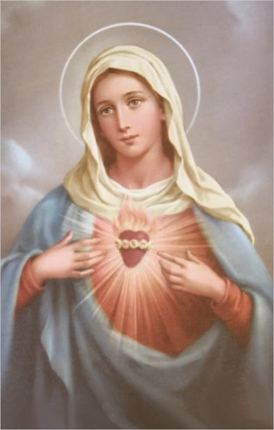
O Most Blessed Mother, heart of love, heart of mercy, ever listening, caring, consoling, hear our prayer. As your children, we implore your intercession with Jesus your Son. Receive with understanding and compassion the petitions we place before you today, especially ...(special intention).
We are comforted in knowing your heart is ever open to those who
ask for your prayer. We trust to your gentle care and intercession, those whom
we love and who are sick or lonely or hurting. Help all of us, Holy Mother, to
bear our burdens in this life until we may share eternal life and peace with
God forever. Amen.
Why is there a liturgical memorial of Mary Immaculate Heart? What does the Church teach?
Following the solemnity of the Sacred Heart of Jesus is the feast of the Lord's all holy Mother, the Immaculate Heart of Mary. The two are inseparable and with good reason. It is only with Mary that we meet the face of God in human form. Her yes, her beauty, her purity of heart and body makes it possible for God to be made flesh. As the Mother of God, so our our Mother.
In directing our prayer the Church tells us the feasts of the Sacred Heart and of the Immaculate Heart of Mary have an intimate connection especially known in the Liturgy as a sign of "the mysterium of the Heart of Jesus" because Mary is both Mother and disciple. "As the Solemnity of the Sacred Heart celebrates the salvific mysteries of Christ in a synthetic manner by reducing them to their fount --the Heart of Jesus, so too the memorial of the Immaculate Heart of Mary is a celebration of the complex visceral relationship of Mary with her Son's work of salvation: from the Incarnation, to his death and resurrection, to the gift of the Holy Spirit."
The tradition of the first Saturdays should be kept in tact and promoted because of the close connection with the Holy Eucharist. The first Saturdays teaches the faithful (clergy and laity alike) of the need to repair the break sin causes in both the Divine and human relationship through prayer, mortification and the giving of alms and charitable work. Why? Because "This pious practice should be seen as an opportunity to live intensely the paschal Mystery celebrated in the Holy Eucharist, as inspired by the life of the Blessed Virgin Mary" (DPPL, 174).
This feast is yet another example of the Church giving to her children the opportunity to attend to the affect, that is, to one's humanity, in order to know and love more intimately the salvation given to us in Christ. It is not a one time experience but an on-going, incremental changing of mentality that draws us closer to Christ.
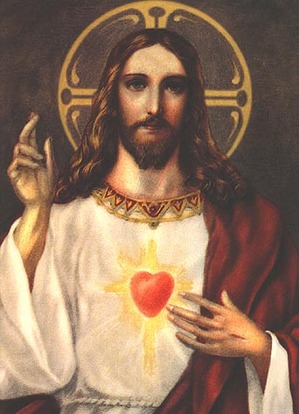 Christians are consecrated, that is, set apart from other things or ways of life for God --the Father, Son and Holy Spirit-- through the sacraments of Initiation. Our entire life as a Christian is based on our reception of and living out of our Baptism, Confirmation and the Eucharist.
Christians are consecrated, that is, set apart from other things or ways of life for God --the Father, Son and Holy Spirit-- through the sacraments of Initiation. Our entire life as a Christian is based on our reception of and living out of our Baptism, Confirmation and the Eucharist.
Father Julián Carrón, published the following commentary on priesthood in the L'Osservatore Romano (June 9, 2010), at conclusion of the Year of Priests.
I will never forget the impact of a question at a spiritual retreat with some priests in Latin America. I had just finished saying that often our faith lacks the human, when a priest approached me and said that when he was in seminary, they taught him that it was better to hide his concrete humanity, not to have it in sight "because it disturbed the journey of faith." This episode made me more aware of how Christianity can be reduced and of the state of confusion in which we are called to live our priestly vocation. Once someone asked Fr. Giussani his advice for a young priest, "That he be above all a man," he answered, to the surprise of those present. We find ourselves at the polar opposite of the advice given the seminarian: on the one hand, to look away from one's humanity, and on the other, a gaze full of fondness for oneself.
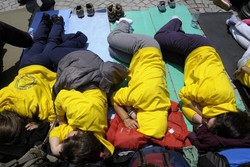
So then, what is decisive for our faith and our vocation? What do we need? Fr. Giussani repeatedly indicated that "the forgetfulness of the 'I'," the absence of authentic interest for one's own person is the "supreme obstacle to our human journey" (Alla ricerca del volto umano, Rizzoli, Milano 1995, p. 9). Instead, true love for oneself, true affection for oneself is what leads us to rediscover our constituent exigencies, our original needs in their nakedness and vastness, so as to see ourselves as relationship with the Mystery, entreaty for the infinite, structural expectant awaiting. Only people so "wounded" by reality, so seriously engaged with their own humanity can open themselves totally to the encounter with the Lord. Fr. Giussani affirms, "In fact, Christ offers Himself as the answer to what "I" am and only an attentive and also tender and passionate awareness of myself can throw me wide open and dispose me to acknowledge, admire, thank, and live Christ. Without this awareness, even that of Jesus Christ becomes a mere name" (At the Origin of the Christian Claim, McGill-Queen's University Press, Montreal 1998, p. 4).
"There is no response more absurd than that to a question one hasn't asked" wrote Reinhold Niebuhr. This also applies to us when we uncritically submit to the influence of the culture in which we are immersed, which seems to favor the reduction of humanity to our biological, psychological and sociological antecedents. But if humanity is truly reduced to this, what is our task as priests? What use are we? What is the sense of our vocation? How can we resist a flight from reality, taking refuge in spiritualism or formalism, seeking alternatives that make life bearable? Or wouldn't it be better, obeying the cultural climate, to become social assistants, psychologists, cultural operators or politicians? As Benedict XVI reminded us in Lisbon, "Often we are anxiously preoccupied with the social, cultural and political consequences of the faith, taking for granted that faith is present, which unfortunately is less and less realistic. Perhaps we have placed an excessive trust in ecclesial structures and programs, in the distribution of powers and functions; but what will happen if salt loses its flavor?" (Homily at Holy Mass at Terriero do Paco of Lisbon, May 11, 2010).
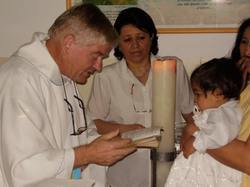
Therefore, everything depends on the perception, first of all for us, of what humanity is and what truly corresponds to our infinite desire. The decision with which we live our vocation therefore derives from the decision with which we live our being men. Only within an authentically human vibration can we know Christ and let ourselves be fascinated by Him, to the point of giving Him our lives to make Him known to others. "Why does the faith still absolutely have a chance of success?" then Cardinal Ratzinger asked himself, and answered, "I would say because it finds correspondence in the nature of man. [...] In man there is an inextinguishable nostalgic aspiration toward the infinite. None of the answers sought is sufficient; only the God who has made Himself finite, to lacerate our finiteness and lead it in the breadth of His infinity, is able to meet the questions of our being. Therefore today as well, Christian faith will return to find humanity." (Fede, Verità, Tolleranza [Faith, Truth, Tolerance] Cantagalli, Siena 2003, pp. 142-143).
This certainty that Benedict
XVI testifies to continually even in the face of all the evil we bring upon
ourselves or cause others - just think of the pedophilia issue - invites us on
a journey to rediscover and deepen our understanding of the reasonableness of
the faith: "Our faith is well-founded, but this faith needs to come alive in
each of us [...]: only Christ can fully satisfy the profound longing of every
human heart and give answers to its most pressing questions about suffering,
injustice and evil, concerning death and life hereafter" (Homily at Holy Mass
at Terriero do Paco di Lisbon, May 11, 2010). Only if we experience the truth
of Christ in our life will we have the courage to communicate it and the
audacity to challenge the hearts of the people we meet. In this way, the
priesthood will continue to be an adventure for each of us and thus the
opportunity to testify to our fellow women and men the answer that only Christ
is for the "mystery of our being" (G. Leopardi). Thank you.
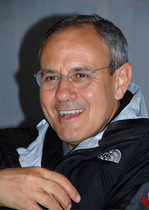
Father Julián Carrón is a priest of the Archdiocese of Madrid and he is the President of the Fraternity of Communion and Liberation centered in Milan, Italy. He was appointed by Benedict XVI to be among the experts at the Synod of Bishops on the Word of God and he is a consultant on the Pontifical Council of the Laity.
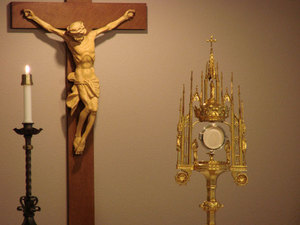
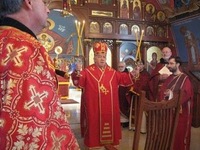 After struggling with Leukemia Metropolitan Basil Myron Schott, OFM, died this morning. He was 71. I have fond memories of meeting the archbishop and always found him to be a kind and holy man.
After struggling with Leukemia Metropolitan Basil Myron Schott, OFM, died this morning. He was 71. I have fond memories of meeting the archbishop and always found him to be a kind and holy man.The Zenit.org news agency gave its readers a previously unpublished letter sent by Pope Pius XII to President Franklin Delano Roosevelt on Aug. 30, 1943, after the Allied Forces bombed Rome. The letter surfaced from the archives of the Knights of Columbus given that it has worked in Rome since 1920. The KofC has recently opened a retrospective exhibit of its work for the Church and humanity in Rome. An unexpected gifts. Why? Because the letter to Roosevelt shows that Pope Pius did advocate for the needs of the defenseless in a dark period of history and that neither Italy nor the Church were free to freely act. Also, the exhibit shows the kind solicitude the KofC has had and continues to have for the work of Christ and the Church.
Your Excellency,
Recent events have naturally focused the world's attention for the moment on Italy, and much has been said and written on what policy she would or should now follow for her own best interests. Too many, we fear, take for granted that she is entirely free to follow the policy of her choice; and we have wished to express to Your Excellency our conviction that this is far from true. Of her desire for peace and to be done with the war, there can be no doubt; but in the presence of formidable forces opposing the actuation or even the official declaration of that desire she finds herself shackled and quite without the necessary means of defending herself.
If under such circumstances Italy is to be forced still to bear devastating blows against which she is practically defenseless, we hope and pray that the military leader will find it possible to spare innocent civil populations and in particular churches and religious institutions the ravages of war. Already, we must recount with deep sorrow and regret, these figure very prominently among the ruins of Italy's most populous and important cities.
But the message of assurance addressed to us by Your Excellency sustains our hope, even in the face of bitter experience, that God's temples and the homes erected by Christian charity for the poor and sick and abandoned members of Christ's flock may survive the terrible onslaught. May God in His merciful pity and love hearken to the universal cry of his children and let them hear once more the voice of Christ say: Peace!
We are happy of this occasion to renew the expression of our sincere good wishes to Your Excellency.
From the Vatican, August 30, 1943
Pius PP XII
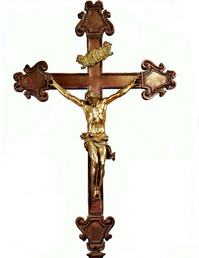
The Pope's homily on the role of the Cross in our theology was a good reminder of who are as a people of faith: merciful, loving, and hope-filled. Sin and death don't have the last word in life. It is sad that we don't remember this more often, clergy and laity alike. This homily made me reflect back on an experience I had a few weeks back when I was told a priest in this particular parish preached that Catholics are "Easter people" and not a "Good Friday people." Sorely misguided. On June 5th in Cyprus Pope Benedict celebrated the Votive Mass of the Holy Cross (praying the various votive Masses is a good and noble tradition when there is no specific liturgical memorial that particular day) when he acknowledged the work of devoted priests, brothers, sisters catechists and the lay movements in preaching and teaching the Truth. In the face of difficult and sometimes evil situations the Pope encouraged his congregation (and us) to base their (our) lives on the Cross. For Christians, the cross is not a failure but the symbol --the reality-- of mercy, forgiveness, faith, hope and joy. And it is the goal of priests and religious to conform their lives to their Cross because it is at the foot of the Cross that we know the full power of the Trinity's love for us. Plus, the Pope reminds us that we are not the center of the faith, Christ is: it is His wisdom and salvation we communicate to others, not our own.
Here are excerpts from the Pope's homily:
Beguiled by the serpent, Adam had foresaken his filial trust in God and sinned by biting into the fruit of the one tree in the garden that was forbidden to him. In consequence of that sin, suffering and death came into the world. The tragic effects of sin, suffering and death were all too evident in the history of Adam's descendants. We see this in our first reading today, with its echoes of the Fall and its prefiguring of Christ's redemption.
As a punishment for their sin, the people of Israel, languishing in the desert, were bitten by serpents and could only be saved from death by looking upon the emblem that Moses raised up, foreshadowing the Cross that would put an end to sin and death once and for all. We see clearly that man cannot save himself from the consequences of his sin. He cannot save himself from death. Only God can release him from his moral and physical enslavement. And because he loved the world so much, he sent his only-begotten Son, not to condemn the world - as justice seemed to demand - but so that through him the world might be saved. God's only-begotten Son had to be lifted up just as Moses lifted up the serpent in the desert, so that all who looked upon him with faith might have life.
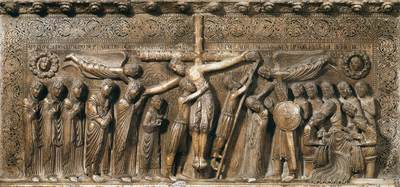
The wood of the Cross became the vehicle for our redemption, just as the tree from which it was fashioned had occasioned the Fall of our first parents. Suffering and death, which had been a consequence of sin, were to become the very means by which sin was vanquished. The innocent Lamb was slain on the altar of the Cross, and yet from the immolation of the victim new life burst forth: the power of evil was destroyed by the power of self-sacrificing love.
The Cross, then, is something far greater and more mysterious than it at first appears. It is indeed an instrument of torture, suffering and defeat, but at the same time it expresses the complete transformation, the definitive reversal of these evils: that is what makes it the most eloquent symbol of hope that the world has ever seen. It speaks to all who suffer - the oppressed, the sick, the poor, the outcast, the victims of violence - and it offers them hope that God can transform their suffering into joy, their isolation into communion, their death into life. It offers unlimited hope to our fallen world.
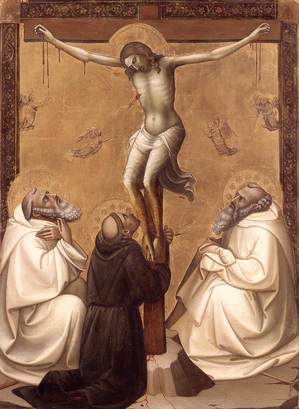
That is why the world needs the Cross. The Cross is not just a private symbol of devotion, it is not just a badge of membership of a certain group within society, and in its deepest meaning it has nothing to do with the imposition of a creed or a philosophy by force. It speaks of hope, it speaks of love, it speaks of the victory of non-violence over oppression, it speaks of God raising up the lowly, empowering the weak, conquering division, and overcoming hatred with love. A world without the Cross would be a world without hope, a world in which torture and brutality would go unchecked, the weak would be exploited and greed would have the final word. Man's inhumanity to man would be manifested in ever more horrific ways, and there would be no end to the vicious cycle of violence. Only the Cross puts an end to it. While no earthly power can save us from the consequences of our sins, and no earthly power can defeat injustice at its source, nevertheless the saving intervention of our loving God has transformed the reality of sin and death into its opposite. That is what we celebrate when we glory in the Cross of our Redeemer. Rightly does Saint Andrew of Crete describe the Cross as "more noble, more precious than anything on earth [...] for in it and through it and for it all the riches of our salvation were stored away and restored to us" (Oratio X; PG 97, 1018-1019).
Dear brother priests, dear religious, dear catechists, the message of the Cross has been entrusted to us, so that we can offer hope to the world. When we proclaim Christ crucified we are proclaiming not ourselves, but him. We are not offering our own wisdom to the world, nor are we claiming any merit of our own, but we are acting as channels for his wisdom, his love, his saving merits. We know that we are merely earthenware vessels, and yet, astonishingly, we have been chosen to be heralds of the saving truth that the world needs to hear. Let us never cease to marvel at the extraordinary grace that has been given to us, let us never cease to acknowledge our unworthiness, but at the same time let us always strive to become less unworthy of our noble calling, lest through our faults and failings we weaken the credibility of our witness.
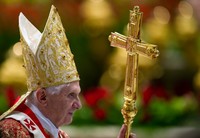
In this Year for Priests, let me address a special word to the priests present today, and to those who are preparing for ordination. Reflect on the words spoken to a newly ordained priest as the Bishop presents him with the chalice and paten: "Understand what you do, imitate what you celebrate, and conform your life to the mystery of the Lord's Cross". As we proclaim the Cross of Christ, let us always strive to imitate the selfless love of the one who offered himself for us on the altar of the Cross, the one who is both priest and victim, the one in whose person we speak and act when we exercise the ministry that we have received. As we reflect on our shortcomings, individually and collectively, let us humbly acknowledge that we have merited the punishment that he, the innocent Lamb, suffered on our behalf. And if, in accordance with what we have deserved, we should have some share in Christ's sufferings, let us rejoice because we will enjoy a much greater gladness when his glory is revealed.
Watch the YouTube clip on the teaching of Pope Benedict on the Cross
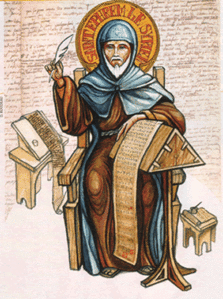 It is indeed fitting to honor the blessed deacon of
Edessa for his desire that the preaching of the divine word and the training of
his disciples rest on the purity of Sacred Scripture. He also acquired honor as
a Christian musician and poet. He was so accomplished in both arts that he was
called the "lyre of the Holy Spirit." From this, Venerable Brothers,
you can learn what arts promote the knowledge of sacred things. Ephrem lived
among people whose nature was attracted by the sweetness of poetry and music.
The heretics of the second century after Christ used these same allurements to
skillfully disseminate their errors. Therefore Ephrem, like youthful David
killing the giant Goliath with his own sword, opposed art with art and clothed
Catholic doctrine in melody and rhythm. These he diligently taught to boys and
girls, so that eventually all the people learned them. In this fashion he not
only renewed the education of the faithful in Christian doctrine and supported
their piety with the spirit of the sacred liturgy, but also happily kept
creeping heresy at bay.
It is indeed fitting to honor the blessed deacon of
Edessa for his desire that the preaching of the divine word and the training of
his disciples rest on the purity of Sacred Scripture. He also acquired honor as
a Christian musician and poet. He was so accomplished in both arts that he was
called the "lyre of the Holy Spirit." From this, Venerable Brothers,
you can learn what arts promote the knowledge of sacred things. Ephrem lived
among people whose nature was attracted by the sweetness of poetry and music.
The heretics of the second century after Christ used these same allurements to
skillfully disseminate their errors. Therefore Ephrem, like youthful David
killing the giant Goliath with his own sword, opposed art with art and clothed
Catholic doctrine in melody and rhythm. These he diligently taught to boys and
girls, so that eventually all the people learned them. In this fashion he not
only renewed the education of the faithful in Christian doctrine and supported
their piety with the spirit of the sacred liturgy, but also happily kept
creeping heresy at bay.Pope Benedict XV
Principi Apostolorum Petro (On St. Ephrem the Syrian), 5 October 1920
It bears reading and knowing what the Church advocates with regard to the Sacred Heart of Jesus. Why? Because we are meant to be in relationship with God through Jesus by the power of the Holy Spirit. We live in relation (communio) to Jesus --as Savior, brother, Redeemer, lover-- through whom we see the face of God. In The Directory on Popular Piety and the Liturgy tells us:
The Roman Pontiffs have frequently averted to the scriptural basis of devotion to the Sacred Heart of Jesus.
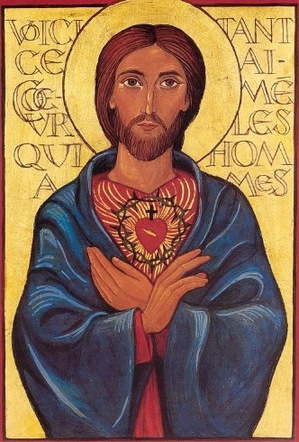
Jesus, who is one with the Father (cf. John 10, 30), invites his disciples to live in close communion with him, to model their lives on him and on his teaching. He, in turn, reveals himself as "meek and humble of heart" (Mt 11, 29). It can be said that, in a certain sense, devotion to the Sacred Heart of Jesus is a cultic form of the prophetic and evangelic gaze of all Christians on him who was pierced (cf. John 19, 37; Zac 12, 10), the gaze of all Christians on the side of Christ, transfixed by a lance, and from which flowed blood and water (cf. John 19, 34), symbols of the "wondrous sacrament of the Church".
The Gospel of St. John recounts the showing of the Lord's hands and his side to the disciples (cf. John 20,20), and of his invitation to Thomas to put his hand into his side (cf. John 20, 27). This event has also had a notable influence on the origin and development of the Church's devotion to the Sacred Heart.
These and other texts present Christ as the paschal Lamb, victorious and slain (cf. Apoc 5,6). They were objects of much reflection by the Fathers who unveiled their doctrinal richness. They invited the faithful to penetrate the mysteries of Christ by contemplating the wound opened in his side. Augustine writes: "Access is possible: Christ is the door. It was opened for you when his side was opened by the lance. Remember what flowed out from his side: thus, choose where you want to enter Christ. From the side of Christ as he hung dying upon the Cross there flowed out blood and water, when it was pierced by a lance. Your purification is in that water, your redemption is in that blood" (ed. emphasis).
Devotion to the Sacred Heart was particularly strong during the middle ages. Many renowned for the learning and holiness developed and encouraged the devotion, among them St. Bernard (+1153), St. Bonaventure (+ 1274), the mystic St. Lutgarda (+1246), St Mathilda of Marburg (+ 1282), the sainted sisters Mathilda (+ 1299) and Gertrude (+ 1302) of the monastery of Helfta, and Ludolf of Saxony (+1380). These perceived in the Sacred Heart a "refuge" in which to recover, the seat of mercy, the encounter with him who is the source of the Lord's infinite love, the fount from which flows the Holy Spirit, the promised land, and true paradise.
In the modern period devotion to the Sacred Heart of Jesus underwent new developments. At a time when Jansenism proclaimed the rigours of divine justice, the devotion to the Sacred Heart of Jesus served as a useful antidote and aroused in the faithful a love for Our Lord and a trust in his infinite mercy symbolized by his Heart. St. Francis de Sales (+ 1622) adopted humility, gentleness (cf. Mt 11, 29) and tender loving mercy, all aspects of the Sacred Heart, as a model for his life and apostolate. The Lord frequently manifested the abundant mercy of his Heart to St. Margaret Mary (+ 1690); St. John Eudes (+ 1680) promoted the liturgical cult of the Sacred Heart, while St. Claude la Colombière (+ 1682) and St. John Bosco (+ 1888) and other saints were avid promoters of devotion to the Sacred Heart.
Devotions to the Sacred Heart of Jesus are numerous. Some have been explicitly approved and frequently recommended by the Apostolic See. Among these, mention should be made of the following:
- personal consecration, described by Pius XI as "undoubtedly the principal devotional practice used in relation to the Sacred Heart";
- family consecration to the Sacred Heart, in which the family, by virtue of the Sacrament of Holy Matrimony already participating in the mystery of the unity and love of Christ for the Church, is dedicated to Christ so that he might reign in the hearts of all its members;
- the Litany of the Sacred Heart of Jesus, approved for the whole Church in 1891, which is evidently biblical in character and to which many indulgences have been attached;
- the act of reparation, a prayer with which the faithful, mindful of the infinite goodness of Christ, implore mercy for the offences committed in so many ways against his Sacred Heart;
- the pious practice of the first Fridays of the month which derives from the "great promises" made by Jesus to St. Margaret Mary.
At a time when sacramental communion was very rare among the faithful, the first Friday devotion contributed significantly to a renewed use of the Sacraments of Penance and of the Holy Eucharist. In our own times, the devotion to the first Fridays, even if practised correctly, may not always lead to the desired spiritual fruits. Hence, the faithful require constant instruction so that any reduction of the practice to mere credulity, is avoided and an active faith encouraged so that the faithful may undertake their commitment to the Gospel correctly in their lives. They should also be reminded of the absolute preeminence of Sunday, the "primordial feast", which should be marked by the full participation of the faithful at the celebration of the Holy Mass.
Devotion to the Sacred Heart is a wonderful historical expression of the Church's piety for Christ, her Spouse and Lord: it calls for a fundamental attitude of conversion and reparation, of love and gratitude, apostolic commitment and dedication to Christ and his saving work. For these reasons, the devotion is recommended and its renewal encouraged by the Holy See and by the Bishops. Such renewal touches on the devotion's linguistic and iconographic expressions; on consciousness of its biblical origins and its connection with the great mysteries of the faith; on affirming the primacy of the love of God and neighbour as the essential content of the devotion itself.
Popular piety tends to associate a devotion with its iconographic expression. This is a normal and positive phenomenon. Inconveniences can sometimes arise: iconographic expressions that no longer respond to the artistic taste of the people can sometimes lead to a diminished appreciation of the devotion's object, independently of its theological basis and its historico-salvific content.
This can sometimes arise with devotion to the Sacred Heart: perhaps certain over sentimental images which are incapable of giving expression to the devotion's robust theological content or which do not encourage the faithful to approach the mystery of the Sacred Heart of our Saviour.
Recent time have seen
the development of images representing the Sacred Heart of Jesus at the moment
of crucifixion which is the highest expression of the love of Christ. The
Sacred Heart is Christ crucified, his side pierced by the lance, with blood and
water flowing from it (cf, John 19, 34). (167-173).
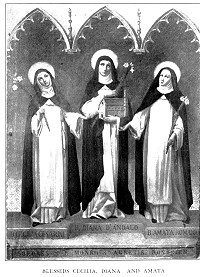 Merciful Lord, we welcome in joy the feast of Blessed
Diana and Blessed Cecilia. With the help of their prayers may devotion to truth
and love for our brothers and sisters fill our hearts and our lives.
Merciful Lord, we welcome in joy the feast of Blessed
Diana and Blessed Cecilia. With the help of their prayers may devotion to truth
and love for our brothers and sisters fill our hearts and our lives.

- Saint Meinrad monks and colleagues speak about the Benedictine Way of Life and Slow Communication
- Today the Benedictine monks and administration of Kansas' Benedictine College's commitment to green living with a new building project.
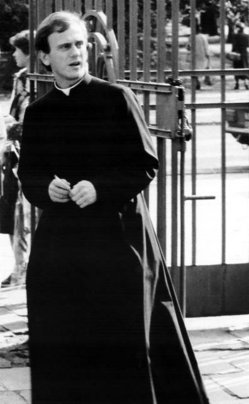
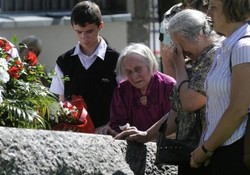
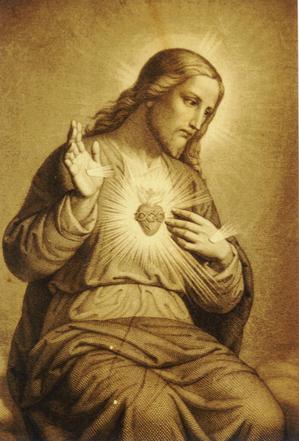 For a long time the Church has dedicated the month of June to the Sacred Heart of Jesus. The designation of the solemn feast of the Sacred Heart is on the Friday following the feast of Corpus Christi. This year the Sacred Heart feast is celebrated on June 11.
For a long time the Church has dedicated the month of June to the Sacred Heart of Jesus. The designation of the solemn feast of the Sacred Heart is on the Friday following the feast of Corpus Christi. This year the Sacred Heart feast is celebrated on June 11.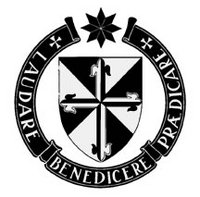 For nearly a month the Dominican friars of the Province of Saint Joseph (the Eastern Province) elected and/or appointed as capitulars will be at Providence College doing the normal business of governance and making a review (and coming to some decision) on how they live the charism given by Saint Dominic.
For nearly a month the Dominican friars of the Province of Saint Joseph (the Eastern Province) elected and/or appointed as capitulars will be at Providence College doing the normal business of governance and making a review (and coming to some decision) on how they live the charism given by Saint Dominic.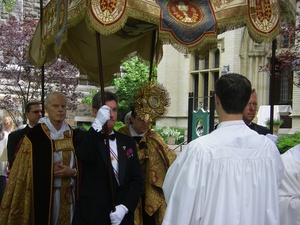 O sacred Banquet in which Christ is received, the memory of His Passion is recalled, the mind is filled with grace, and pledge of future glory is given to us.
O sacred Banquet in which Christ is received, the memory of His Passion is recalled, the mind is filled with grace, and pledge of future glory is given to us.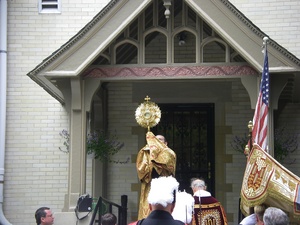
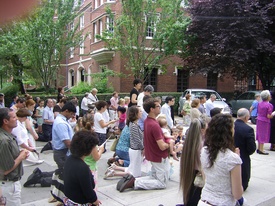
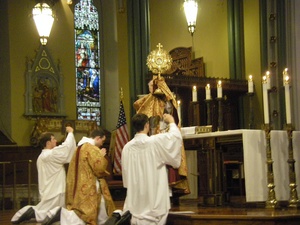
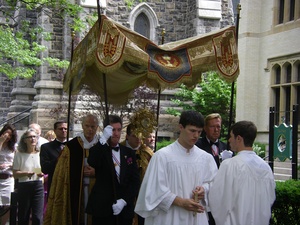
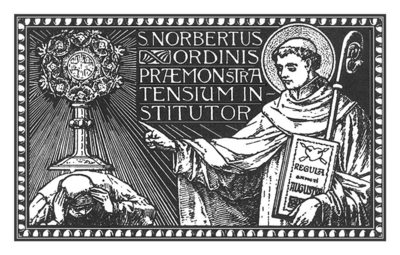
J. Michael Thompson
Copyright © 2010, World Library Publications
76 76 D, ST. KEVIN, AVE VIRGO VIRGINUM
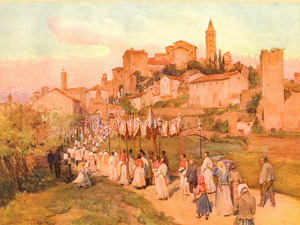 Of the glorious Body telling,
Of the glorious Body telling,O my tongue, its mystery sing,
and the Blood, all price excelling,
which the Gentiles' Lord and King,
in a noble womb once dwelling,
shed for this world's ransoming.
Given for us, for us descending
of a Virgin to proceed,
man with man in converse blending,
scattered He the gospel seed,
till His sojourn drew to ending,
which He closed in wondrous deed.
At the last great Supper lying,
circled by His brethren's band,
meekly with the Law complying,
first He finished its command,
then, immortal Food supplying,
gave Himself with His own hand.
Word-made-flesh, by word He maketh
very bread, His Flesh to be;
man in wine Christ's Blood partaketh,
and if senses fail to see,
faith alone the true heart waketh
to behold the mystery.
Therefore we, before Him bending,
this great Sacrament revere;
types and shadows have their ending,
for the newer Rite is here;
faith, our outward sense befriending,
makes the inward vision clear.
Glory let us give and blessing
to the Father and the Son;
honor, might, and praise addressing,
while eternal ages run,
ever too His love confession,
who from Both with Both is One.
Amen.
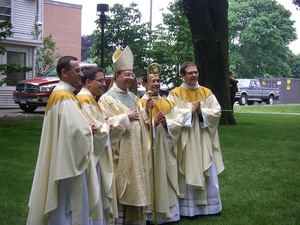 The Most Reverend William E. Lori ordained four deacons to the holy priesthood of Jesus Christ today at Mass celebrated at the Cathedral of Saint Augustine, Bridgeport, CT. The newly ordained priests, Fathers Jeffrey Couture, Karol Ksiazek, Jaime Marin-Cardona and Michael Novajosky will serve in the Diocese of Bridgeport.
The Most Reverend William E. Lori ordained four deacons to the holy priesthood of Jesus Christ today at Mass celebrated at the Cathedral of Saint Augustine, Bridgeport, CT. The newly ordained priests, Fathers Jeffrey Couture, Karol Ksiazek, Jaime Marin-Cardona and Michael Novajosky will serve in the Diocese of Bridgeport.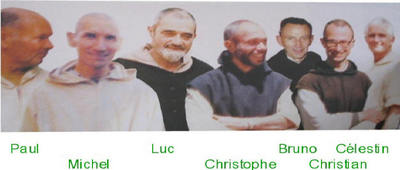 The
recent Cannes Film Festival showed the film about the 1996 Trappist martyrs of Our Lady of
Atlas in Algeria. The film got rave reviews and awarded 2nd place. The film is in French and it will be
available on DVD with English subtitles. While we wait for the full film to be available here is
a clip on Youtube with subtitles at: Of Gods and Men.
The
recent Cannes Film Festival showed the film about the 1996 Trappist martyrs of Our Lady of
Atlas in Algeria. The film got rave reviews and awarded 2nd place. The film is in French and it will be
available on DVD with English subtitles. While we wait for the full film to be available here is
a clip on Youtube with subtitles at: Of Gods and Men.
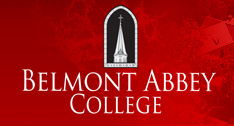 Come enjoy deepening your faith and learning how to
better defend it from some of America's leading Catholic apologists,
while having a blast in the great outdoors in a setting that's close to heaven:
nestled in the Pisgah National Forest in the Blue Ridge Mountains of North
Carolina. (Go to www.2FunCamps.com
to check out our gorgeous conference site. Boys and girls will sleep in
separate camps, but will be together during the day.)
Come enjoy deepening your faith and learning how to
better defend it from some of America's leading Catholic apologists,
while having a blast in the great outdoors in a setting that's close to heaven:
nestled in the Pisgah National Forest in the Blue Ridge Mountains of North
Carolina. (Go to www.2FunCamps.com
to check out our gorgeous conference site. Boys and girls will sleep in
separate camps, but will be together during the day.) Christ's love for us. Now Christ leads him
to a place of honor before his Father in heaven.
Christ's love for us. Now Christ leads him
to a place of honor before his Father in heaven.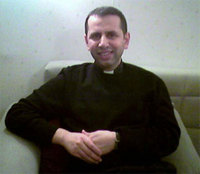 June 3rd is quickly becoming a date that most Christians will not forget too easily: 1) the liturgical memorial of Saint Charles Lwanga, 19th century African martyrs; 2) the death of Blessed Pope John XXIII; 3) the murder of Father Ragheed and his companions; and now 3) the murder of Bishop Luigi Padovese, OFM Cap.
June 3rd is quickly becoming a date that most Christians will not forget too easily: 1) the liturgical memorial of Saint Charles Lwanga, 19th century African martyrs; 2) the death of Blessed Pope John XXIII; 3) the murder of Father Ragheed and his companions; and now 3) the murder of Bishop Luigi Padovese, OFM Cap.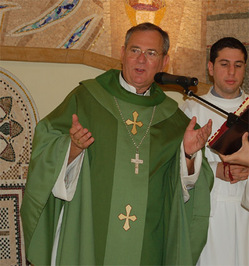 Bishop Luigi Padovese, OFM Cap, 63, was murdered today at about 1pm local time by his driver who it is claimed had psychological problems and history of violent outbreaks was supposedly a convert to Christianity but some news agencies are naming the driver a Muslim. At the moment no one is claiming political motivation for the murder.
Bishop Luigi Padovese, OFM Cap, 63, was murdered today at about 1pm local time by his driver who it is claimed had psychological problems and history of violent outbreaks was supposedly a convert to Christianity but some news agencies are naming the driver a Muslim. At the moment no one is claiming political motivation for the murder.
Bishop Padovese was born at Milan, Italy and a member of the Capuchin Franciscan order. He was ordained a priest for nearly 37 years and a bishop for 5.5 years. He was the Vicar Apostolic in Anatolia.
Bishop Padovese was to meet Pope Benedict XVI with other Middle East bishops in Cyprus to receive the Instumentum laboris, the working document for the forthcoming Synod of Bishops, scheduled to meet in October.
The Minister General of the Capuchins posted this brief bio for Bishop Luigi.
The BBC story noted here and Spero News here.
May God grant mercy Bishop Luigi Padovese mercy and may his memory be eternal.
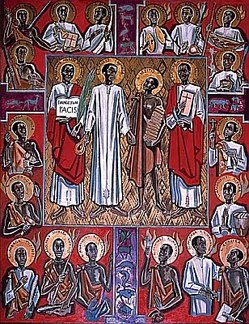 Today's the liturgical memorial of some of the most evocative witnesses to Jesus Christ who gave their lives for the Christian Faith of the 19th century. I pray that Saint Charles and companions intercede not only for Africa but for all who claim the Church as mother and family and who find it difficult to truly live their faith. More on Saint Charles here.
Today's the liturgical memorial of some of the most evocative witnesses to Jesus Christ who gave their lives for the Christian Faith of the 19th century. I pray that Saint Charles and companions intercede not only for Africa but for all who claim the Church as mother and family and who find it difficult to truly live their faith. More on Saint Charles here.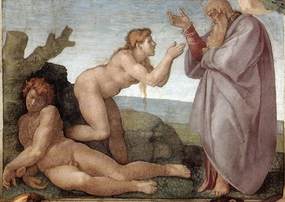
The very first question that God asks man in the Bible is, where are you? "The Lord called to the man, and said to him, where are you?" (Genesis 3:9) It is not a question that demands sophisticated answers nor are there multiple answers to this question. Rather, it is a question of concern from a loving father and the only demand placed upon this question is that one answers truthfully, even if the truth exposes something to us that highlights our selfishness and our need for God.
Before God asked Adam this question Adam had committed a sin by disobeying God's commandment and ate from the tree God had forbidden him to eat from. Adam had forgotten about God's love and choose to place his own will and desires over the will and desires of God. Now Adam, ashamed and afraid (which is always the fruit of sin) tries to hide from God because he realizes something dramatic has occurred in his relationship with the Lord. The Lord simply asks him, Adam, where are you?
This question, as old as the Bible itself, God continues to ask us today. Throughout our lives, throughout each day, and often several times a day, God is continually asking us, "My son or my daughter, where are you? In other words, where is your heart right now? Is it tired, frustrated, angry? Is it overwhelmed by the demands of life? Is it engrossed in selfish activities? Is it immersed in lust, pride, envy, jealousy, etc? Is it distracted by the things of this world?
When the Lord asks us this question it is an invitation from him to turn our eyes away from the many distractions we often promote and to turn our eyes once again towards Him. It is our Father, gentle tapping us on the shoulder and calling us back to Him. Rather than living in future events, or reliving past wounds over and over again it is an invitation to experience God in the present moment, the only place where we can be guaranteed to encounter God.
Brother Jeremiah Myriam Shryock, CFR, a Fourth Year Seminary Student Saint Joseph's Seminary-Dunwoodie, Yonkers, NY. Brother Jeremiah was ordained a deacon on May 29, 2010 with three other Franciscan Friars of the Renewal by the Most Reverend Manual Cruz, an auxiliary bishop of Newark. A poem of Brother Jeremiah's, "After Eden," was published here.
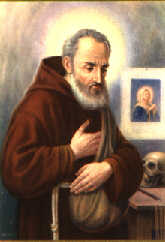 Lord, my portion and my cup, You hold my lot secure; I keep the Lord before me always, for with him at my right hand nothing can shake or disturb me.
Lord, my portion and my cup, You hold my lot secure; I keep the Lord before me always, for with him at my right hand nothing can shake or disturb me.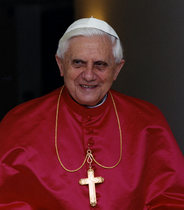 United with Pope Benedict in prayer for the needs of the Church, for the month of June we keep in heart and mind with the Pope the following:
United with Pope Benedict in prayer for the needs of the Church, for the month of June we keep in heart and mind with the Pope the following:
The general intention
That every national and international institution may strive to guarantee respect for human life from conception to natural death.
The mission intention
That the Churches in Asia, a "little flock" among non-Christian populations, may communicate the Gospel well and give joyful witness to their faith.
